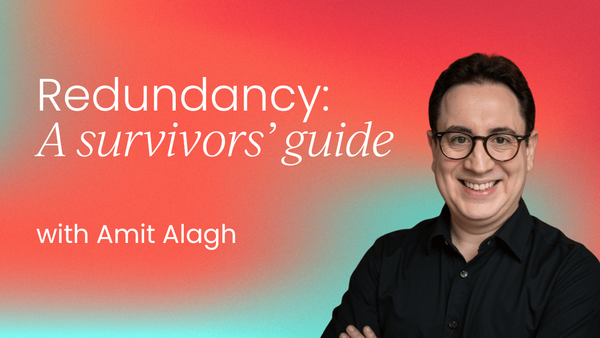Redundancy is something one hopes will never happen to them. Sadly, just like death and taxes, it is one of life’s certainties.
In the three months to September 2024, there were around 90,000 redundancies made in the United Kingdom, compared with 80,000 in the previous month. Unlike our parent’s generation, there is no such thing as a “job for life”.
As someone who has been through redundancy and mentored many of my peers who have experienced the same, I hope that sharing my story will help you prepare in case this ever happens to you.
- My story of redundancy
- The signs of redundancy
- How do I feel now?
- What to do if you need to make an employee redundant
- What to do if you’re made redundant
- Learnings and advice for others who are made redundant
- Final thoughts
My story of redundancy
How I was made redundant
I still remember that ad-hoc meeting with my manager creeping into my diary, I had an inkling something was wrong as my 1:1 was normally earlier in the week.
The call started with pleasantries asking how I am, followed by them taking a deep breath and saying “I’m really sorry to inform you that your position has been selected for elimination”.
All I remember at that moment was my heart accelerating and those words repeating over and over in my head in a continuous loop. My manager kept speaking and explaining the process going forward but it could not register. Such was the impact of those words, my Apple watch alerted me to an elevated heartbeat.
My initial reaction was disbelief. I had been a strong performer and, at the beginning of the year, had a good appraisal which pointed to a long-term career at the organization.
As the news sunk in and my manager finished speaking, I could feel my throat dry, my eyes well up and my voice cracked as I asked, “How long have I got left?”.
I was informed 30 days; “I am really sorry, Amit, this situation sucks”, my manager said.
The many late nights, weekends sacrificed and personal events canceled owing to work meant nothing now. I felt like the rug had been pulled out from under me and my world was collapsing.
The call continued with an explanation of what the next steps were, but they didn’t register.
When the call ended, I remember sitting at my desk with my head in my hands, followed by wandering around my house aimlessly in a daze, wondering how long before I have to pack up everything and put it into storage and/or move back in with the parents.
In every situation like this, your mind gravitates toward the worst-case scenario.
As the eldest child in my family, I considered myself the provider, the one who would support my retired parents and set the standard for my brother and those who look up to me as a role model. I have mentees who look to me for support and guidance, how could I now go to them and tell them “I was made redundant”?
The first call I made
The first call I made after the bad news was to my parents and I still remember shaking and replaying that conversation over and over and the words “Your position has been selected for elimination”.
I remember telling my parents and there was silence. Then, they told me optimistically, “Don’t worry you will find another job”. I am glad they still believed in me when I felt my employer did not.
That evening, I was due to go out for dinner with other product marketers at a Product Marketing Alliance meet-up. I remember the train journey into the city.
It felt like the longest journey in the world as I continuously worried, “Do I tell the people I meet tonight?”.
After receiving the bad news, I could have just as easily withdrawn and gone into isolation but in all honesty, I didn’t want to be alone in my thoughts.
I remember attending the dinner and putting on a brave face and then going to the meet-up and being the jovial, networking character that I am. For those hours I forgot I was made redundant, I was reminded of who I was, what I brought to the table, and the good work I had done in building the community and supporting my peers.
As I met new people and answered their questions about my career and their challenges in product marketing, I realized I knew my craft and it was my organization's loss if they didn’t need me.
The day after learning I was being made redundant
I spent the next day reviewing my finances, making drastic decisions on what expenses to cut (goodbye Sky and Netflix!). Treating myself like a start-up, I was building “run rate” spreadsheets to work out how long I could survive on my savings.
I saw my Outlook calendar fill up with meetings and new projects that went beyond my departure date. I was still unclear about whether I could talk to colleagues or not, so began to withdraw. The countdown to my last day felt like a long goodbye as if I was waiting for an execution.
The last day at work
On my last day, A leaving card was shared and once again I was reminded about the wonderful colleagues I was leaving behind.
I take comfort in the following messages:
“Your generosity and willingness to help anyone, are unmatched! It has been a fun ride and I wish you all the best in the future!"
“Amit, you've brought a pure joy to working here. You always brought a smile, wit, humor, and a lasting impression to every conversation. I'm going to miss working with you and of course, seeing your red throne in the background. I know you will flourish wherever you go! Stay in touch.”
I remember on that last day, shutting down my laptop for the final time and whispering to myself “Over and out, the end of an era”. At that moment, I finally felt I was at peace, no longer having the Sword of Damocles hanging over me.
The signs of redundancy
Whilst it did come as a surprise, I had always considered my product marketing skills industry and product-agnostic and had hoped, in a situation like this, my skills could be put to good use elsewhere. Sadly, I was surplus to requirements.
In terms of signs, you can read into a lot of things and let the mind go into overdrive. But those who have been affected have reported the following as indicators that redundancies are looming:
- Integration of overlapping departments following M&A (mergers and acquisitions)
- Change in company leadership
- Peers leaving and not being replaced
- Marketing deprioritized for certain products
- Being excluded from key meetings and business trips
Was I angry about it? How do I feel now?
It’s different for various people. For those I have met on this journey, the feeling of job loss is akin to losing a loved one, for others it can feel like a betrayal.
For me, it was a numbing feeling where my work had become synonymous with my personal life and my worries were not about losing my job but worrying about what was next for me.
Reflecting a few months on, I am at peace with it and wish all my former colleagues the best.
The time I had spent unemployed was akin to a “reset”. I was able to embark on a daily gym routine and pursue new product marketing opportunities outside my current industry. It also gave me time to pause and think about:
- What do I want in my next role, and
- What I should prioritize e.g. high salary or long-term career progression opportunities.
Although it did not feel like it at the time, I see my redundancy as a blessing. Most people who hate their jobs will take any job to escape a difficult work environment. I had the beauty of choice and was blessed to have many interviews every week and was able to choose which processes I progressed with/withdrew from.
What to do if you need to make an employee redundant
As a manager, what can you do if you're ever in a position where you have to make someone redundant?
Treat the departing employee with dignity and respect
Those who have been affected have reported that when redundancy is communicated to the affected employee, all recurring meetings are canceled and this makes the departed employee feel like they have been “cast adrift”.
This made them feel isolated, as there was no one in the organization they could talk to about their feelings or what would happen next.
Those who have been affected have reported the redundancy process as being “rigid and adversarial” in nature. There is no need for this type of behavior. Treat others as you would like to be treated.
Show empathy
Communicate with the employee on how news of their exit will be communicated, there have been instances where departures are not communicated, it is assumed remaining colleagues will find out after the departed employee has left.
This is a concerning situation as a redundancy is an “involuntary departure” and not communicating this could infer that the departure was untoward.
Follow-up with kindness
Departed employees have reported that colleagues who remain did not get in touch. This is known as “Survivors’ Guilt”.
There is no guidance on what to do when someone is let go and as a result, the natural human inclination is to stay away.
It’s almost akin to animals abandoning their sick peers for fear of succumbing to illness themselves.
What to do if you’re made redundant
Accept the reality of redundancy
When faced with redundancy, it’s essential to acknowledge the situation rather than fight against it. Trying to resist is like clinging to a relationship that has already ended – it’s an uphill battle you won’t win.
Remember, redundancy is a temporary phase, not a permanent state. Soon, you’ll find a new environment where you can thrive rather than merely survive. Keep in mind the mantra: “This too shall pass.”
Maintain your dignity and professionalism
Redundancy can evoke emotions like anger, frustration, and self-doubt, and it’s natural to ask, “Why me?” However, maintaining professionalism is crucial. Avoid burning bridges with your employer or colleagues, no matter how tempting it might be.
The professional world is smaller than you think, and the peers you leave behind could become allies in your next chapter. Short-sighted actions during this time can harm your reputation and future job prospects.
Separate yourself from the role
There’s no shame in being made redundant – it’s the role that’s no longer needed, not you. It’s vital to distinguish between your personal brand and your professional identity.
Too often, people intertwine their sense of self with their corporate brand, making it harder to reinvent themselves when a role ends. Focus on building a strong personal brand; after all, people connect with people, not companies.
Nurture your network
Investing in your professional network during good times pays off in challenging ones. Generosity with your time and goodwill fosters relationships that can support you when you need them most.
Avoid being the person who only takes without giving back. Networking isn’t just a resource for finding opportunities; it’s also a way to build lasting connections.

Prioritize self-care
Take care of yourself physically and emotionally. Whether through therapy, conversations with friends, or pursuing hobbies, find ways to process your experience.
Recognize that redundancy is not personal – it’s just business. Activities like exercising or mentoring can be incredibly rewarding. Mentoring, in particular, can reaffirm your skills and purpose, even as you navigate this transitional phase.
Adopt healthy habits
During this period, resist the temptation to numb the hurt you are feeling with excessive drinking or unhealthy eating. These behaviors can worsen feelings of helplessness and prolong recovery. Instead, focus on eating nourishing food and engaging in activities that support your well-being.
Find strength in community
Seek out others who are also navigating redundancy. Being part of a community can be empowering and uplifting. Hearing about others’ resilience and positivity can remind you that you’re not alone in this journey.
Look forward, not back
Avoid the urge to constantly check in with former colleagues to ask how things are without you. Dwelling on the past can prevent you from moving forward. Embrace the opportunity to focus on the future and build a new chapter.
Trust the process of change
Change, though unsettling, often leads to better opportunities. Consider the following perspective:
“When big changes occur in our lives, they can seem frightening, as we often assume the worst. But significant changes usually mean something better is on the horizon. The universe doesn’t allow a vacuum – when one thing leaves, another comes in to take its place. Relax, have faith, and trust that the change is for the good.”
Source inspiration for yourself
Staying motivated during a job search can be challenging, but finding sources of inspiration can make a big difference. One way to keep your spirits high is to create a playlist of empowering songs that resonate with your journey.
Here are some suggestions to get you started:
- Riding Solo by Jason Derulo
- Unwritten - Natasha Beddingfield
- Chumbawumba: I get knocked down but I get up again
- Black Shorts Vol 1 (yeh yeh)
- Fighter – Christine Aguilera
- Green Day – Good Riddance (Time of Your Life)
Another great source of motivation can be uplifting speeches. These are some that provided me with perspective and strength:
Steve Jobs’ Commencement Speech: A profound reminder of the importance of connecting the dots and following your passion.
“Rise Up” (from the TV Show Greenleaf): A powerful and uplifting call to action.
Rachel Scott’s Speech: A moving and thought-provoking reflection on compassion and resilience.
Learnings and advice for others who are made redundant
Embrace the natural ups and downs of job hunting
There will be days when you feel like you’ve applied to every available job and there’s nothing left to pursue. This is completely normal – don’t be too hard on yourself during these quieter periods. Use them to recharge and strategize rather than fall into self-doubt.
Make use of available resources
If you find yourself needing financial support, don’t hesitate to “sign on” and collect unemployment benefits. These benefits exist for times like this, and there’s no shame in using them when you need them most. Swallow your pride, and focus on moving forward.
Collaborate, don’t compete
Job hunting is not a competition, and viewing others as rivals can be counterproductive. Instead, be generous with your time and knowledge. For example, if a recruiter contacts you about a role that doesn’t suit you, recommend someone in your network who might be a better fit.
Similarly, if you’re in the same interview process as a peer, be open and transparent – share your experiences and insights. This mindset aligns with the principle: “We rise by lifting others.”
Shift from “why me” to “try me”
Redundancy can feel deeply personal, but it’s important to reframe the situation. Use this time as an opportunity to reset and reflect. Ask yourself:
- Who am I, and what is my personal North Star?
- What aspects of my work do I enjoy, and what do I want to do more of?
This period, often called “funemployment,” can be a chance to realign your goals and discover new growth opportunities.
Invest in upskilling and learning
Take advantage of the free time to upskill and explore areas you’ve always wanted to learn more about. For some, this might mean diving into topics like AI or Google Analytics.
For others, it could mean revisiting professional courses, like Product Marketing Alliance (PMA) certifications, and discovering updated content that focuses on emerging trends.
Protect and rebuild your confidence
Don’t let redundancy shake your self-belief. Remind yourself of your accomplishments and how far you’ve come in your career.
Redundancy might not happen again (there are no guarantees), but you can at least take comfort in knowing you're now better prepared to handle it in the future.
Leverage strength-finding tools
Tools that help identify your strengths and ideal work environments can be incredibly valuable. These resources provide insights into your personality and help you prioritize opportunities with organizations that align with your values and skill set.

Engage with the professional community
Immerse yourself in communities relevant to your field, such as the Product Marketing Alliance community.
This is not only an opportunity to learn from others but also a chance to give back through mentoring. Sharing your journey and advice can inspire others while enabling you to gain insights from senior professionals in the field.
Final thoughts
Redundancy is a challenging and often emotional experience, but it also offers an opportunity for growth and reinvention.
By staying resilient, maintaining your confidence, and supporting others, you can turn this period into a chance to reflect, upskill, and realign with your goals.
Remember, it’s not just about finding the next job – it’s about discovering the right path for your future. This too shall pass, and with the right mindset, you’ll come out stronger and more prepared for whatever lies ahead.
In terms of parting word, if there is one thing I would ask you to take away from my story:
Embrace the uncertainty of what lies ahead, yet hold fast to the belief that whatever comes... you will be okay.


















 Follow us on LinkedIn
Follow us on LinkedIn





.svg?v=85af970283)